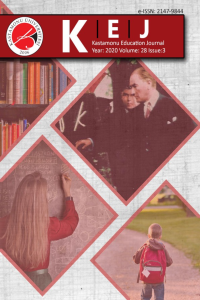Abstract
References
- Akyol, H. (2015). Türkçe ilkokuma yazma öğretimi[Turkish Early Reading and Writing Teaching] (14. Press). Ankara: Pegem Academy.
- Asoko, H. (2002). Developing Conceptual Understanding in Primary Science. Cambridge Journal of Education, 32(2), 37–41. https://doi.org/10.1080/0305764022014752
- Bacanak, A. (2002). Fen Bilgisi Öğretmen Adaylarının Fen Okuryazarlıkları İle Fen-Teknoloji-Toplum Dersinin Uygulanışını Değerlendirmeye Yönelik Bir Çalışma [A Study about the evaluation of the science student teachers' scientific literacy and application of science-technology-society course]. Karadeniz Technical University.
Determination of Scientific Literacy Levels of Primary School Teachers and Investigation in Terms of Different Variables
Abstract
Purpose: The purpose of this study is to investigate how variables gender, seniority, age and graduated department affect the science literacy levels of primary school teachers.
Design/Methodology/Approach: In the study, the survey method used. The study group of the study consists of 506 primary school teachers, 337 females, and 169 male teachers, working in primary schools in Bursa province and its districts during the 2020-2021 academic year. "Science for All Americans" publication, which was prepared by Laugksch and Spargo in 1996 and translated into Turkish by Duruk in (2012), “Basic Science Literacy Test”, which all validity and reliability tests were carried out,was used to obtain research data. Data were analyzed with descriptive statistics, Mann Whitney U and Kruskal Wallis techniques.
Findings: As a result of examining the research data; no significant difference was observed between the variables of gender, seniority, graduated department and the science literacy levels of primary school teachers. However, it is observed that the age variable has a significant difference for the science-technology-society sub-dimension. It has been determined that this difference is in favor of the groups under 25 years old among the groups between ages of 31-35, under the age of 25, and over the age of 40.
Highlights: This research provides valuable data to holistically evaluate many different affective variables that affect the scientific literacy level of primary school teachers. Although this research includes the results of primary school teachers in a single province, the obtained evidence predicts the need for them to be supported in terms of scientific literacy and its sub-dimensions.
Keywords
Scientific literacy Scientific content knowledge Nature of science Science-technology-society Primary school teacher
References
- Akyol, H. (2015). Türkçe ilkokuma yazma öğretimi[Turkish Early Reading and Writing Teaching] (14. Press). Ankara: Pegem Academy.
- Asoko, H. (2002). Developing Conceptual Understanding in Primary Science. Cambridge Journal of Education, 32(2), 37–41. https://doi.org/10.1080/0305764022014752
- Bacanak, A. (2002). Fen Bilgisi Öğretmen Adaylarının Fen Okuryazarlıkları İle Fen-Teknoloji-Toplum Dersinin Uygulanışını Değerlendirmeye Yönelik Bir Çalışma [A Study about the evaluation of the science student teachers' scientific literacy and application of science-technology-society course]. Karadeniz Technical University.
Details
| Primary Language | English |
|---|---|
| Subjects | Studies on Education |
| Journal Section | Research Article |
| Authors | |
| Publication Date | October 28, 2022 |
| Acceptance Date | October 26, 2022 |
| Published in Issue | Year 2022 Volume: 30 Issue: 4 |


